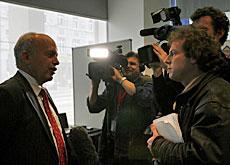
Wind of change set to blow in Swiss politics

Swiss politics is set for changes after the unexpectedly high successes of the rightwing Swiss People's Party in Sunday's general election, analysts say.
They note that Swiss relations with the European Union will not be any easier and that Switzerland’s image abroad may not have been helped.
The campaign was dominated by controversy over Justice Minister Christoph Blocher and his People’s Party’s hard-line stance on immigrants and crime.
A People’s Party poster campaign depicting white sheep kicking a black sheep off a Swiss flag drew worldwide media attention and criticism from the United Nations.
“Swiss politics will certainly change. The tough nut to crack will remain Switzerland’s relationship with the EU,” political scientist Regula Stämpfli told swissinfo.
Her view was shared by a leading writer on Swiss affairs, Clive Church, an emeritus professor at Britain’s Kent University.
Take notice
“I think the EU is going to sit up and take notice of the election result. It’s not going to encourage the EU to have any illusions about the likelihood of Switzerland joining. They will obviously draw the consequences from that,” he said.
“Switzerland is far more integrated with Brussels than the rhetoric of the Swiss People’s Party would suggest.”
Church said he could see it becoming much more difficult to maintain a policy of aligning Swiss practices on the EU.
He also believes that the controversial election campaign led by the People’s Party helped increase voter turnout by about three per cent.
“One rather suspects that the campaign was the reason why it went up. On the other hand, I have a suspicion that the campaign has done Switzerland in general no service in terms of its image abroad.
“Because it’s becoming increasingly seen by people who know little about the country as being racist, which is a considerable exaggeration,” he told swissinfo.

More
Consensus politics and power-sharing
Image abroad
Pascal Sciarini, director of the political science department at Geneva University also told swissinfo that the image of Switzerland “would not improve”.
“There is a real concern abroad in respect of what is happening in Switzerland. It is going to be difficult to explain that the People’s Party is not on the extreme right as for example the National Front in France.”
The analysts agree that Justice Minister Blocher will not be ousted in December’s scheduled election of the seven-member cabinet.
Curious
“It would be very curious to imagine a government without the Swiss People’s Party, which is the largest in Switzerland,” Sciarini said.
Church said he thought it likely that Blocher would never be defeated in the cabinet election.
“This makes it almost impossible that he could be turned out. Any party that really tries to turn him out is likely to suffer in public opinion.”
He added that there was no doubt the People’s Party “with the wind in their sails” was going to be more assertive and probably have more influence on policy.
“Their success in this election reinforces what I see as their view of Swiss democracy, which is a highly populist one. For them what counts is what the people think, particularly when it comes to referendums.”
“That’s going to be enhanced at the expense of what you might say is the more constitutionalist checks and balances view of Swiss democracy.”
swissinfo, Robert Brookes
House of Representatives
People’s Party: 62 seats (+7, compared with 2003)
Social Democratic Party: 43 seats (-9)
Radical Party: 31 seats (-5)
Christian Democrats: 31 seats (+3)
Greens: 20 seats (+6)
Others: 13 seats (-2)
Total: 200 seats
Results from the elections to the Senate are incomplete.
The Green Party won its first seat in the 46-member chamber.
Run-off elections are needed in eight of the country’s 26 cantons.

In compliance with the JTI standards
More: SWI swissinfo.ch certified by the Journalism Trust Initiative































You can find an overview of ongoing debates with our journalists here . Please join us!
If you want to start a conversation about a topic raised in this article or want to report factual errors, email us at english@swissinfo.ch.